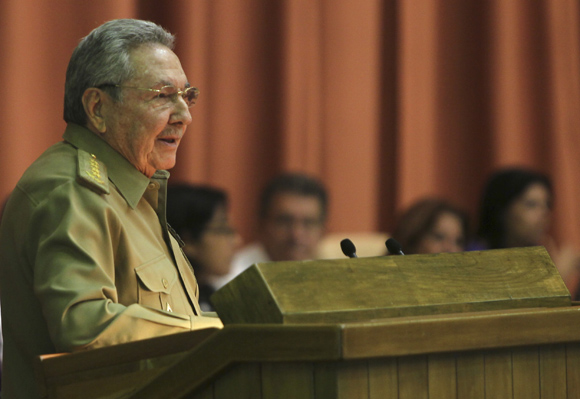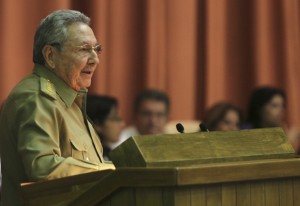
Excerpts from Castro’s address to Parliament
Following are excerpts from President Raúl Castro’s speech before the National Assembly on Saturday, as translated by Progreso Weekly. Full text — in Spanish — of the address can be found in Cubadebate.com.
 The process of monetary unification will not affect those who legally earn income in both foreign currency and pesos, or the cash in the hands of the population or deposits in the domestic banking system. […] In itself, this decision is not the magic solution to our problems, but it will contribute decisively to improve the functioning of the economy and the building of a prosperous and sustainable socialism, less egalitarian and more just, which ultimately will bring greater benefits to all Cubans.
The process of monetary unification will not affect those who legally earn income in both foreign currency and pesos, or the cash in the hands of the population or deposits in the domestic banking system. […] In itself, this decision is not the magic solution to our problems, but it will contribute decisively to improve the functioning of the economy and the building of a prosperous and sustainable socialism, less egalitarian and more just, which ultimately will bring greater benefits to all Cubans.
At the same time, the instruments are being improved for the control of the issuance of currency and the financial balance of the population in the new scenario, which envisions a growing performance of the non-state sector. The gradual deployment of a credit policy that provides more access to financing, both to individuals and to the various forms of management, cooperative or private, has been maintained.
Moreover, a package of measures has been set in motion that makes the social object of the socialist state enterprise more flexible — in an orderly manner — and grants it greater autonomy, encouraging a better use of its productive capacities and access to the market, after fulfilling its commitments to the state.
The creation of the Special Development Zone in Mariel has attracted huge interest. It is destined to become a major magnet for foreign investment and at the same time an area for the testing of modern technologies and management methods, in harmony with the preservation of the environment. At the end of next January, we shall inaugurate the first phase of the Container Terminal to be built there, along with other vital infrastructures, funding for which has been provided by the supportive Brazilian government.
In the same vein, the Council of Ministers approved improvements to the foreign-investment policy, a factor of singular importance for the energizing of our country’s economic and social development. In this connection, we are drafting a bill on the subject, which we expect to submit to a future meeting of the National Assembly which, as we agreed yesterday, will be in March, in an extraordinary session to discuss this and other issues.
The expansion of the experiment in non-agricultural cooperatives has continued, and more than 250 of them are in operation, although the brief time elapsed still does not allow a comprehensive evaluation of its results. At this stage, continuous monitoring and control of the experience by the governing institutions of each activity are required, to detect and promptly correct any deviation.
More than 440,000 Cubans are engaged in self-employed labor, and it is expected that this modality will continue to grow as a result of the further easing of existing regulations and the expansion of the activities included in this form of non-state management.
Now then, as both the Party and Government — we also said this about the unions at the time — have the duty to facilitate self-employment and banish the stigma and prejudice that existed toward it, everyone must guarantee order and respect for the law and a strict compliance with the taxes and other fees established for these workers.
Recent events have revealed an inadequate control by the government institutions in the face of illegalities in the practice of self-employment that were not dealt with in a resolute and timely manner, creating an atmosphere of impunity that in turn stimulated the rapid growth of activities that had never been authorized in the scope defined for certain occupations .
Regardless of the measures that we were forced to take to correct these phenomena, I believe it desirable that we analyze the causes of their emergence and rapid spread and learn the lesson, which is summarized in the realization that each step we take must be accompanied by the establishment and preservation of a climate of ORDER, DISCIPLINE AND EXIGENCY, that problems must be anticipated prior to their appearance and, if they arise, we must act immediately, without hesitation, preferably when they are small and isolated, which will always be preferable to paying the political costs caused by inertia and passivity in enforcing the law.
Let us not delude ourselves, the road we have chosen will not be free of obstacles and risks, but success will depend on the intelligence, patience and above all the firmness with which we act, with the support of our people and the workers in this sector, most of whom comply with the local regulations.
We shall continue to move forward decisively in implementing the resolutions of the Sixth Congress, without haste but without pause, I repeat, without haste but without pause, despite various exhortations made with good intentions and others that definitely were not. We are not unaware that those who urge us to speed up are pushing us toward failure, disunity and [are aiming] to damage the trust and support of the people in the construction of socialism, or what is the same, the independence and sovereignty of the Cuban nation, which were brought to this country and upheld only by socialism.
Let no one doubt that those of us who have devoted nearly a lifetime to those ideals are, for obvious reasons, among the most interested in advancing at greater speed. History records many experiences about the disastrous results of breaking pace and skipping steps, which instead of advancing the realization of a program inevitably lead to retreat and defeat.
Neither we, the so-called historical leadership of the Revolution, nor the new generations will allow the work of the Revolution to be wasted. There will be no room to subject our people to the effects of the failed adjustment packages that condemn the large majorities to misery. We shall never allow in revolutionary Cuba shock therapies like those we’re seeing in the wealthy and so-called cultured Europe, which would plunge the country into a climate of division and instability that could serve as a pretext for interventionist adventures against the nation. […]
While in recent times we have been able to carry out some exchanges on issues of mutual benefit between Cuba and the United States, we believe that we can solve other issues of interest and establish a civilized relationship between the two countries, in line with the wishes of our people, the vast majority of U.S. citizens, and the Cuban émigrés.
As far as we are concerned, we have expressed on many occasions our willingness to maintain a respectful dialogue with the United States, on equal terms and without compromising the independence, sovereignty and self-determination of our nation. We do not ask the United States to change its political and social system, nor do we agree to negotiate ours. If we really want to advance in our bilateral relations, we’ll have to learn to mutually respect our differences and get used to coexisting peaceably with them. That’s the only way. Otherwise, we are prepared to endure another 55 years in the same situation (Applause).
(Photo: Ladyrene Pérez/Cubadebate)

